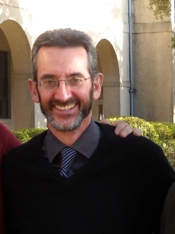People
John Protevi

Professor, Phyllis M. Taylor Professor of French Studies
Ph.D.: Loyola University Chicago, 1990
Phone: (225) 578-6664
Email: [email protected]
Office: 408 Hodges
Website: www.protevi.com/john/
Biography
John Protevi received his Ph.D. in philosophy from Loyola University Chicago in 1990. A long-time member of the faculty in French Studies at LSU, he was named Phyllis M. Taylor Professor of French Studies in 2011. In 2012 he also became Professor of Philosophy with teaching duties in the Department of Philosophy and Religious Studies.
Areas of Interest
Professor Protevi teaches courses primarily in contemporary French philosophy (Foucault and Deleuze) and plans to offer courses in philosophy of mind and philosophy of biology. His research focuses on the intersections of dynamical systems theory; the cognitive, life, and earth sciences; and contemporary French philosophy.
Courses Offered:
- FREN 7410 Contemporary French Thought
- HNRS 2013 Evolution and Biology of Morality
- PHIL 2035 History of Modern Philosophy
Awards and Honors
- Distinguished Visiting Professor, Institute for the Arts and Humanities, Pennsylvania State University, 2015
- LSU Distinguished Faculty Award, 2013
- Scots Philosophical Club, Centenary Fellow, University of Dundee, Fall 2012
- LSU College of HSS Manship Summer Research Grant, July 2011
- LSU Council on Research Summer Research Stipend, July 2004
Selected Publications
- Edges of the State (Minnesota, 2019)
- Life, War, Earth: Deleuze and the Sciences (Minnesota, 2013)
- Political Affect: Connecting the Social and the Somatic (Minnesota, 2009)
- Editor, Edinburgh Dictionary of Continental Philosophy (Edinburgh, 2005); North American edition, A Dictionary of Continental Philosophy (Yale, 2006)
- “Semantic, Pragmatic, and Affective Enactment at Occupy Wall Street.” Theory & Event 14.4 Supplement.
- “Mind in Life, Mind in Process: Toward a New Transcendental Aesthetic and a New Question of Panpsychism.” Journal of Consciousness Studies 18.5-6 (2011): 94-116.
- “Adding Deleuze to the Mix.” Phenomenology and the Cognitive Sciences 9.3 (September 2010): 417-436.